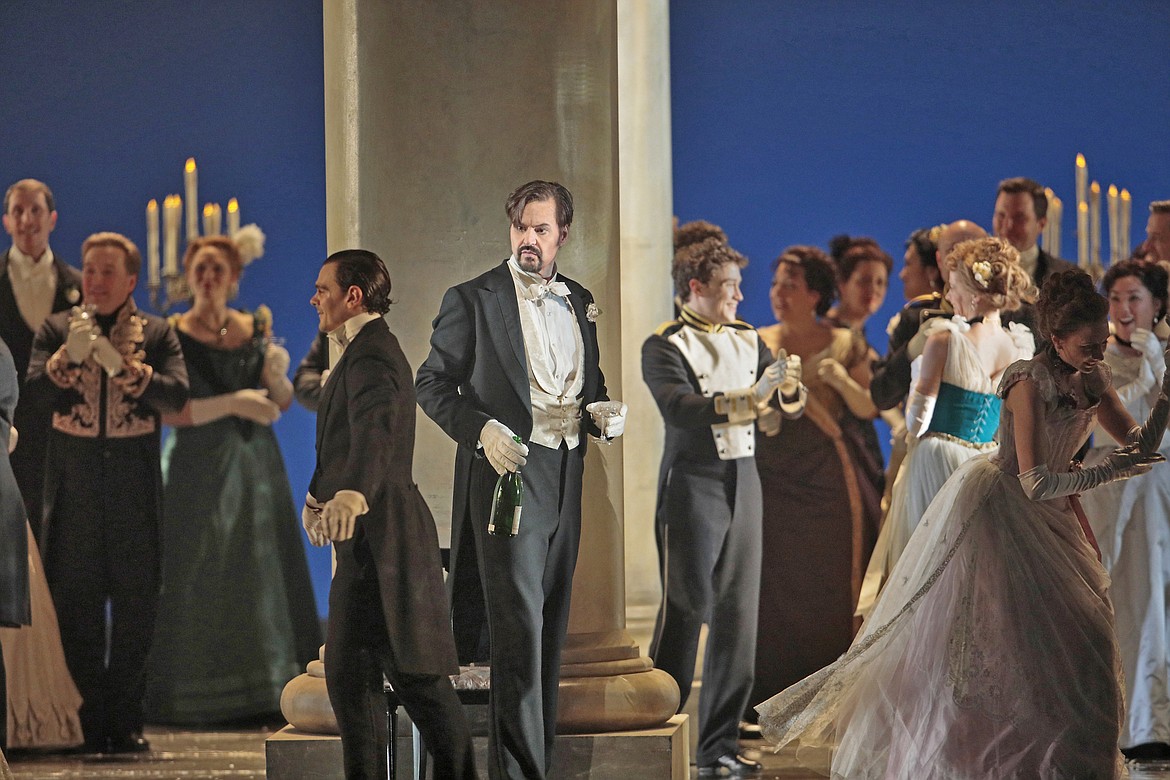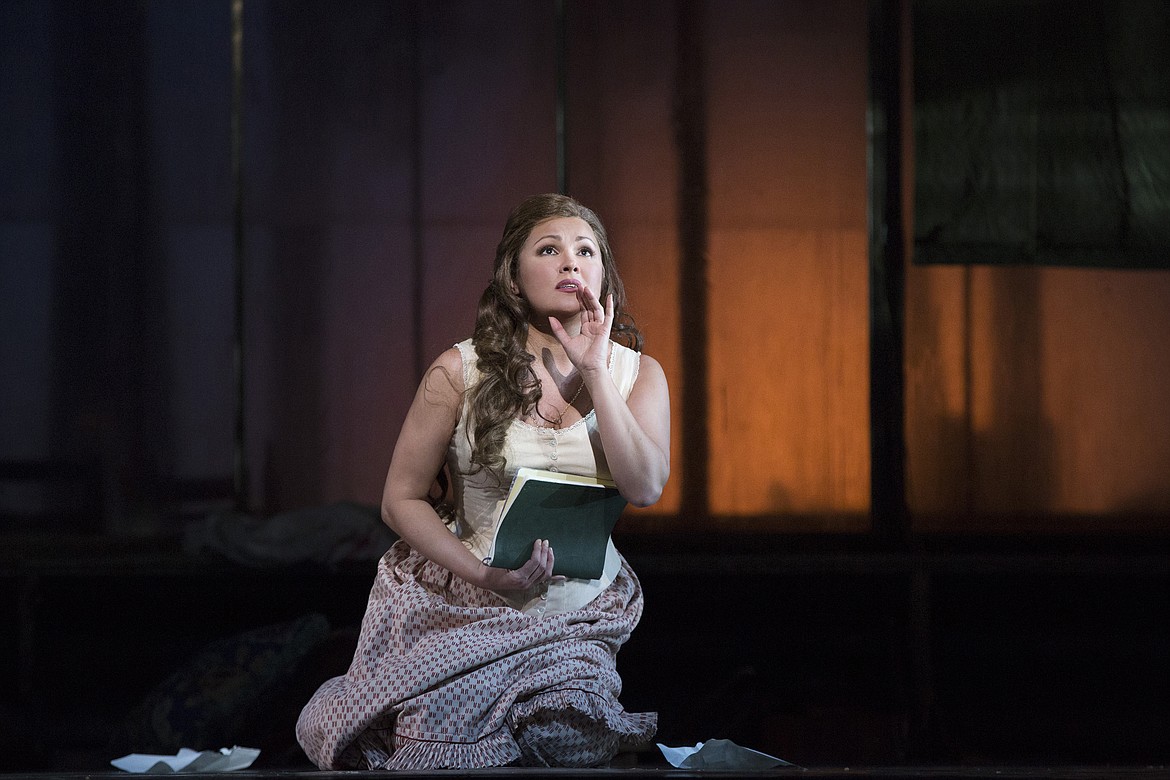Tchaikovsky's 'Eugene Onegin' up next for The Met: Live in HD
Tchaikovsky’s luscious opera Eugene Onegin (“oh-NYAY-gen”) will be broadcast live in HD at Kalispell’s Signature Cinema 14 Saturday, April 22 at 10:55 a.m., and the recorded performance will be shown at the Whitefish Performing Arts Center the following Saturday, April 29 also at 10:55 a.m., as part of The Met: Live in HD series.
The opera is sung in Russian with English subtitles. The run time is three hours and 38 minutes, including two intermissions.
Tickets at the Whitefish Performing Arts Center are $20 for adults, $10 for college students and $5 for younger students, cash or check only accepted.
At the Signature Cinema 14, tickets can be purchased online via www.cinemark.com or at the door. They are $23 for adults, $21 for seniors and $16 for children.
THIS PRODUCTION of “Eugene Onegin” was the very first Live in HD broadcast at the Whitefish Performing Arts Center back in October 2013, and it absolutely blew us away. After four complete seasons of Live in HD at Whitefish (almost 40 operas), “Eugene Onegin” remains one of my personal favorites. The core story line is the maturation of Tatiana (Russian soprano Anna Netrebko) over a six-year period between the beginning and end of the opera. Captivated as a sentimental teenager by the enigmatic playboy Eugene Onegin, Tatiana matures into a strong-willed woman who ultimately resists Onegin’s desperate advances. This is one of the most convincing character developments in all of opera and highlights a situation and emotions that women of all eras have experienced.
Netrebko is a native Russian singing a Russian score based on the famous Russian verse-novel by Alexander Pushkin, and Netrebko says how she knew the novel and the history behind it even as a little girl, which helps her better depict the story. Netrebko is legendary for her extraordinary acting skills — a real star.
But back to the opera itself. Interestingly, a singer at Moscow’s Bolshoi Theater suggested to Pyotr Tchaikovsky in 1877 that Pushkin’s famous rhyming novel “Eugene Onegin” would make a good opera. Tchaikovsky re-read it and was immediately convinced. He was especially smitten with the “letter scene” in which Tatiana stays up all night writing a passionate love letter to Onegin, who she has just met.
Coincidentally, Tchaikovsky himself had just the month before received a passionate declaration of love from a former conservatory student of his. Immersing himself in the Pushkin score put Tchaikovsky in the frame of mind to propose marriage to this young woman, and they married. Oh, what a mistake! The marriage was a disaster and he fled within a few months, throwing himself into completing both the libretto (along with his brother Modest Tchaikovsky) and the score of “Eugene Onegin.” It debuted at the Bolshoi in 1881.
ACT 1 (78 minutes): Autumn in the Russian countryside where the widowed Madame Larina has two daughters. The romantic Tatiana spends her time reading novels, the spirited Olga is being courted by their neighbor, the poet Lenski. When Lenski visits with his friend Eugene Onegin, Tatiana falls in love with Onegin and writes him a passionate letter. In response, Onegin declares he can only offer her friendship and condescendingly advises her to control her emotions lest another man take advantage of her innocence.
ACT 2 (44 minutes): Later that winter Onegin has reluctantly accompanied Lenski to Tatiana’s name-day celebration (St. Tatiana’s day in Russia is Jan. 25). Bored by the party, he takes his revenge by flirting with Olga. Lenski’s jealousy is aroused to such a degree that he challenges Onegin to a duel. Both men are full of remorse, but neither stops what is happening. Lenski is killed.
ACT 3 (38 minutes): St. Petersburg, several years later. After traveling abroad, Onegin has returned to the Russian capital. At a ball, Prince Gremin introduces his young wife. Onegin is astonished to recognize her as Tatiana and to realize that he is in love with her. Now it is he who sends her a letter and begs her to run away with him. Tatiana admits that she still loves him, but that she has made her decision and will not leave her husband. Onegin is left desperate, and alone.
TO SING the role of Onegin, the Met originally engaged Russian baritone Dmitri Hvorostovsky, the white-haired Russian who starred in last season’s “Il Trovatore.” Unfortunately, he had to withdraw because of ongoing side effects from brain cancer treatment (he cited poor balance). Swedish baritone Peter Mattei will sing the leading role in the HD broadcast.
Met Radio recently interviewed Mattei, who spoke of the difficulty in playing this character “Eugene Onegin.”
“He is an enigma to even himself,” Mattei explained. “Onegin is never sure how he going to behave, what course of action he is going to take. Something vital is missing in him; it’s as if he missed out on something as a young child.”
The Russian tenor Alexey Dolgov sings the role of Lenski, and Russian mezzo Elena Maximova sings Tatiana’s sister, Olga. Slovakian bass Stefan Kocan is Gremin, Tatiana’s husband whom she remains loyal to in the end.
Pyotr Ilyich Tchaikovsky is more famous for composing ballets and symphonies than operas, but he did write about a dozen of them. “Eugene Onegin” is undoubtedly his most famous, with “Iolanta” (also a previous HD broadcast) another one.
Although Pushkin set his verse novel “Eugene Onegin” in Russia in the 1820s, Met producer/director Deborah Warner set the action in the late 1870s — about the same time as the opera’s premiere. The three acts occur in distinctly different locales: Act 1 in a rustic farmhouse in the country, Act 2 at a rural Russian equivalent of a “grange hall,” and Act 3 amid the glittering aristocracy (and beautiful dresses) of a St. Petersburg ball. Those who attended this opera broadcast in 2013 may remember the imitation snow falling on the singers in the final scene — a wonderful image.
Sally Murdock is a special contributor to This Week in the Flathead and can be reached at murdock@cyberport.net.






